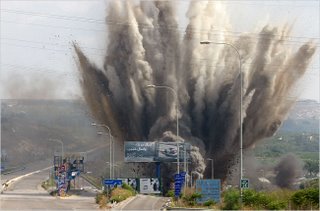Time out in the fighting
From Ha'aretz
Defense Minister Amir Peretz said yesterday that Israel will not allow Hezbollah to man positions close to Israel's border. This criterion is justified and logical, and it should be set as a goal for the current operation in Lebanon.
Israel cannot and should not come to terms with a blatant violation of its sovereignty, along either the Lebanese or the Gaza borders. The launching of Qassam and Katyusha rockets at Israeli citizens in Sderot and the Galilee is unacceptable; the sole question is, what is the best way of stopping them.
After the government has authorized the Israel Defense Forces to use massive force and marked dozens of targets for attack in Lebanon - the Beirut airport being only the first, according to Interior Minister Roni Bar-On; after Lebanon has been placed under siege from land, sea and air, and after dozens of civilians have been killed, it would not be a sign of weakness for Israel to declare a time-out in its military assault in order to allow the Lebanese to reach their own conclusions.
If the aim is really to drive the Hezbollah forces from the border, it is possible that an agreement on this issue can already be reached by the relevant parties. A time-out in the military operation, accompanied by the threat of continued action, could produce immediate results, before civilians on both sides of the border pay the price of escalation.
The operation in Lebanon must have a limited goal, and it should not aspire to alter the reality there and deter the enemy "once and for all," as Bar-On said - whether that enemy is Hezbollah, Iran, Syria or Hamas. It is easy to draw up exaggerated aims and spew statements filled with arrogance and valor, but once things have been said, it is very difficult to take a step back to more moderate and reasonable positions.
The army failed both at Kerem Shalom and on the northern border. Hamas' ability to dig a long tunnel and surprise an IDF outpost on alert, and Hezbollah's ability to surprise a patrol along the northern border two weeks later, should not spur a disproportionate operation that is meant to restore the army's prestige. The IDF must first learn its lessons at the unit and command levels, chastise itself for being overly complacent, and ensure that such failures, which have the potential to fundamentally alter the situation through possible escalation, do not recur.
Professor Eyal Zisser, an expert on the Middle East at Tel Aviv University, said yesterday that Hezbollah Secretary General Hassan Nasrallah is a reasonable man who can make a deal and stick to it, and that it is possible even at this early stage to ask that his forces withdraw from the northern border in exchange for a cessation of the military operation. Those in charge of assessments for the IDF, who misled the government into thinking that Hezbollah would not act against Israel after a soldier was abducted to the Gaza Strip, may think otherwise - but there is no guarantee that they are right.
Israel has a very powerful military, and everyone in the region understands this. But even when there are grounds for employing force, the military's full power should not be used, no matter how justified the action may be. If it is possible to achieve our security goals through diplomacy, a temporary cease-fire should be declared - and hopefully, these aims can be achieved without inflaming the entire region.
Saturday, July 15, 2006
Israel, Lebanon and the cycle of violence

I and the people know
What all schoolchildren learn,
Those to whom evil is done,
Do evil in return.
W.H. Auden
What all schoolchildren learn,
Those to whom evil is done,
Do evil in return.
W.H. Auden
Today my heart is sick and sad. How many more will die before the right of all people to live quietly in peace is respected?
In November 29, 1947, the United Nations voted to partition the British Mandate in Palestine into an independent Jewish state and an independent Arab state:
"The vote on partition was taken at 5:35 P. M. Representatives of Iraq, Saudi Arabia, Syria, and Yemen, four of the six Arab member states, announced that they would not be bound by the Assembly’s decision and walked determinedly out of the Assembly Hall at Flushing Meadow. The Egyptian and Lebanese delegates were silent but walked out, too."
(From the New York Times, November 30, 1947 - article available here)
The Arab war on the putative Jewish state began immediately. Two days after partition, Arabs rioted in Jerusalem, killing two shopkeepers and attacking a synagogue and an ambulance en route to a hospital. Over the next two months, the violence escalated into a full-blown siege of Jerusalem: telephone lines between Jerusalem and the rest of Palestine were severed and because the roads into the city were unpassable, food, water and other vital supplies became scarce. (The siege was not broken until June 1948.)
So began a cycle of violence that has continued unabated since 1947, killing untold thousands of people, resulting in the destruction of countless homes and businesses, and leaving an entire people refugees in their own land.
Today I pray that someone has the wisdom and the strength to do what others could not do, and stop the cycle of war and suffering the has plagued the "Holy Land" for so long.
Namaste.
In November 29, 1947, the United Nations voted to partition the British Mandate in Palestine into an independent Jewish state and an independent Arab state:
"The vote on partition was taken at 5:35 P. M. Representatives of Iraq, Saudi Arabia, Syria, and Yemen, four of the six Arab member states, announced that they would not be bound by the Assembly’s decision and walked determinedly out of the Assembly Hall at Flushing Meadow. The Egyptian and Lebanese delegates were silent but walked out, too."
(From the New York Times, November 30, 1947 - article available here)
The Arab war on the putative Jewish state began immediately. Two days after partition, Arabs rioted in Jerusalem, killing two shopkeepers and attacking a synagogue and an ambulance en route to a hospital. Over the next two months, the violence escalated into a full-blown siege of Jerusalem: telephone lines between Jerusalem and the rest of Palestine were severed and because the roads into the city were unpassable, food, water and other vital supplies became scarce. (The siege was not broken until June 1948.)
So began a cycle of violence that has continued unabated since 1947, killing untold thousands of people, resulting in the destruction of countless homes and businesses, and leaving an entire people refugees in their own land.
Today I pray that someone has the wisdom and the strength to do what others could not do, and stop the cycle of war and suffering the has plagued the "Holy Land" for so long.
Namaste.
Subscribe to:
Comments (Atom)
